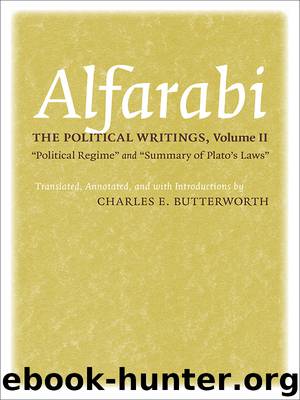The Political Writings by ALFARABI

Author:ALFARABI
Language: eng
Format: epub
Publisher: Cornell University Press
Published: 2015-05-05T16:00:00+00:00
Alfarabi’s Access to Plato’s Laws
In recent times, scholarly debate over whether Alfarabi expounds Plato’s text or merely an abridged version of it has engendered doubt about the value of this treatise. Alfarabi’s unique account of Plato’s approach presented in the introduction to the Summary, subsequent innovative explanations of the text, and willingness to make direct as well as indirect departures from it have prompted the suspicion that he may have been responding to something other than Plato’s Laws. Even though there is ample evidence that two Arabic translations of the Laws were easily available to Alfarabi, one by his student Yaḥyā ibn ‘Adī,9 neither is now extant. It is not possible, therefore, to determine through textual comparisons which of the two he may have used or whether he actually used either one. Nor is it possible to identify the abridged version of the text he may have used or any other source that may have influenced him. It is known that an Arabic translation of Galen’s Synopsis of Plato’s Laws existed at the time Alfarabi was writing, but that is now lost as well. Precisely because these uncertainties have prompted controversy as to how the Summary is to be read and interpreted—that is, whether one can seek to learn something about Plato’s Laws from Alfarabi’s Summary with confidence or must instead be limited to conjectures about its role in the transmission of Greek texts into Arabic—the history of the question deserves attention here.
For our purposes, it begins with Francesco Gabrieli, the first editor of Alfarabi’s Summary of Plato’s Laws. Taken aback at Alfarabi’s novel explanations and unusual terminology, he accounted for them by postulating that Alfarabi was more beholden to Neoplatonic and Syriac intermediary accounts than to his own investigations of Plato’s text. Although Gabrieli was aware of Leo Strauss’s probing interpretation of Alfarabi’s Philosophy of Plato, he dismissed the suggestion that this work contained an esoteric teaching as stemming more from Strauss’s ingenuity than scholarly exegesis. Strauss’s success in illuminating Alfarabi’s insights into Plato’s fuller teaching and admirably detailed examination of the arguments within the text notwithstanding, Gabrieli thought he paid insufficient attention to the influence putative Neoplatonic and Syriac sources could have had on Alfarabi. For him, nothing was to be learned from Alfarabi about Plato or Plato’s teaching. The suggestion that Alfarabi might be indirectly addressing the relationship between philosophy and religion and also between philosophy and politics occasioned no more pause than Strauss’s critique of the textual historian who, blind to the possibly nonhistorical philosophical character of Alfarabi’s text, fails to read him with the same care as Avicenna and Maimonides do. Even Strauss’s illustration of how contradictions and repetitions in Alfarabi’s text could be unraveled or more thoroughly explained by recourse to Maimonides fell on deaf ears.10
Shortly thereafter, Strauss indicated how one might read Gabrieli’s own edition of the Summary in order to elucidate the work’s fuller teaching. He indicated the flaws in Gabrieli’s assumptions about influences and—through detailed attention to particular themes relevant to
Download
This site does not store any files on its server. We only index and link to content provided by other sites. Please contact the content providers to delete copyright contents if any and email us, we'll remove relevant links or contents immediately.
| Arms Control | Diplomacy |
| Security | Trades & Tariffs |
| Treaties | African |
| Asian | Australian & Oceanian |
| Canadian | Caribbean & Latin American |
| European | Middle Eastern |
| Russian & Former Soviet Union |
The Secret History by Donna Tartt(19092)
The Social Justice Warrior Handbook by Lisa De Pasquale(12190)
Thirteen Reasons Why by Jay Asher(8912)
This Is How You Lose Her by Junot Diaz(6889)
Weapons of Math Destruction by Cathy O'Neil(6281)
Zero to One by Peter Thiel(5802)
Beartown by Fredrik Backman(5756)
The Myth of the Strong Leader by Archie Brown(5509)
The Fire Next Time by James Baldwin(5447)
How Democracies Die by Steven Levitsky & Daniel Ziblatt(5219)
Promise Me, Dad by Joe Biden(5154)
Stone's Rules by Roger Stone(5088)
A Higher Loyalty: Truth, Lies, and Leadership by James Comey(4964)
100 Deadly Skills by Clint Emerson(4926)
Rise and Kill First by Ronen Bergman(4790)
Secrecy World by Jake Bernstein(4753)
The David Icke Guide to the Global Conspiracy (and how to end it) by David Icke(4720)
The Farm by Tom Rob Smith(4514)
The Doomsday Machine by Daniel Ellsberg(4490)
